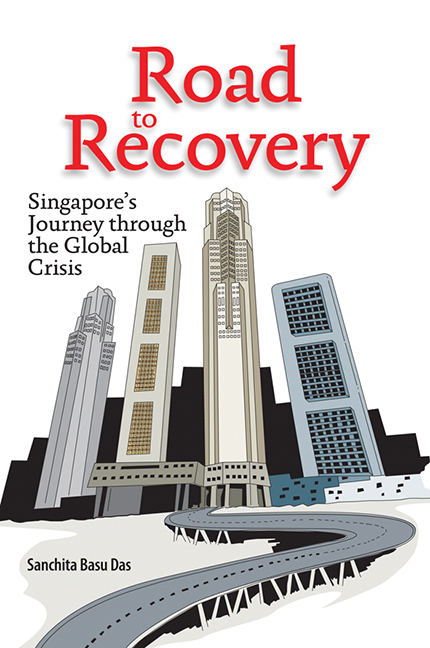Book contents
- Frontmatter
- Dedication
- Contents
- List of Tables
- List of Figures
- List of Boxes
- Foreword
- Acknowledgements
- Abbreviations
- 1 Introduction
- 2 Global Financial and Economic Crisis: Causes, Impact, and Policy Response
- 3 Impact of Global Economic Crisis on Singapore
- 4 Singapore's Policy Responses to the Global Economic Crisis
- 5 Singapore Economic Perspective and Future Policy Directions
- 6 Lessons Learnt
- Appendix I MAS Monetary Policy Statements
- Appendix II Key Budget FY2009 Initiatives
- Appendix III Summary of the ESC Key Recommendations
- Appendix IV Key Budget FY2010 Initiatives
- References
- Index
- About the Author
Appendix II - Key Budget FY2009 Initiatives
Published online by Cambridge University Press: 21 October 2015
- Frontmatter
- Dedication
- Contents
- List of Tables
- List of Figures
- List of Boxes
- Foreword
- Acknowledgements
- Abbreviations
- 1 Introduction
- 2 Global Financial and Economic Crisis: Causes, Impact, and Policy Response
- 3 Impact of Global Economic Crisis on Singapore
- 4 Singapore's Policy Responses to the Global Economic Crisis
- 5 Singapore Economic Perspective and Future Policy Directions
- 6 Lessons Learnt
- Appendix I MAS Monetary Policy Statements
- Appendix II Key Budget FY2009 Initiatives
- Appendix III Summary of the ESC Key Recommendations
- Appendix IV Key Budget FY2010 Initiatives
- References
- Index
- About the Author
Summary
Benefits for Businesses
Jobs for Singaporeans
(A) Jobs credit
To sustain jobs for Singaporeans, the Government will introduce a Jobs Credit, which will encourage businesses to preserve jobs in the downturn. This is a temporary scheme to help companies through an exceptional downturn. Details of the scheme are as follows:
• Employers will receive a 12 per cent cash grant on the first SG$2,500 of each month's wages for each employee on their CPF payroll.
• The Jobs Credit is for one year, and employers will receive the Jobs Credit in four payments: March, June, September and December 2009.
• For each payment, employers will receive Jobs Credits on the employees that are on their CPF payrolls at the start of the quarter in which the payment is made. The wages paid to these employees in the previous quarter will be the qualifying wages used to calculate the 12 per cent cash credit that employers will receive.
∘ For example, for the first payment to be received at the end of March 2009, businesses will receive Jobs Credit on the employees that are on their payrolls in January 2009. The wages paid to these employees in October to December 2008 will be the qualifying wages used to calculate the 12 per cent cash credit that employers will receive.
(B) Spur for workers and professionals
To help Singaporeans upgrade their skills so that they can stay employed or seek re-employment, the Government launched the Skills Programme for Upgrading and Resilience (SPUR), which provided higher course fee support for companies and individuals and absentee payrolls for companies that send their workers for training.
The Government will make the following enhancements to SPUR to help PMETs re-train:
• Course fee subsidies for PMET-level courses that are eligible for SPUR will be increased from 80 per cent to 90 per cent, the same subsidy level as rank-and-file level courses. This includes all Specialist and Advanced Diplomas offered by the polytechnics.
- Type
- Chapter
- Information
- Road to RecoverySingapore's Journey through the Global Crisis, pp. 150 - 180Publisher: ISEAS–Yusof Ishak InstitutePrint publication year: 2010

